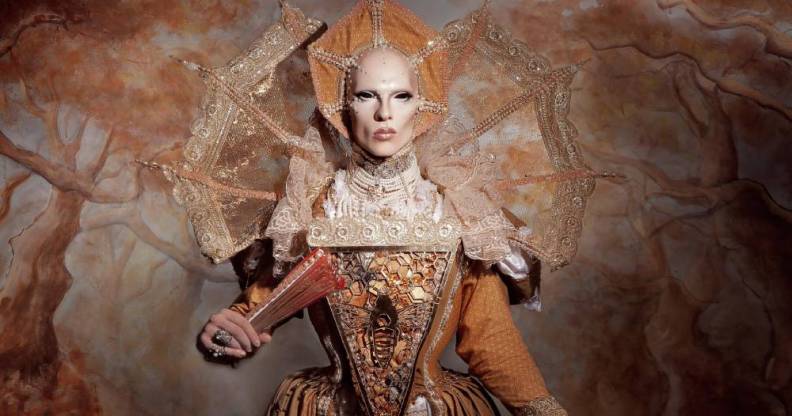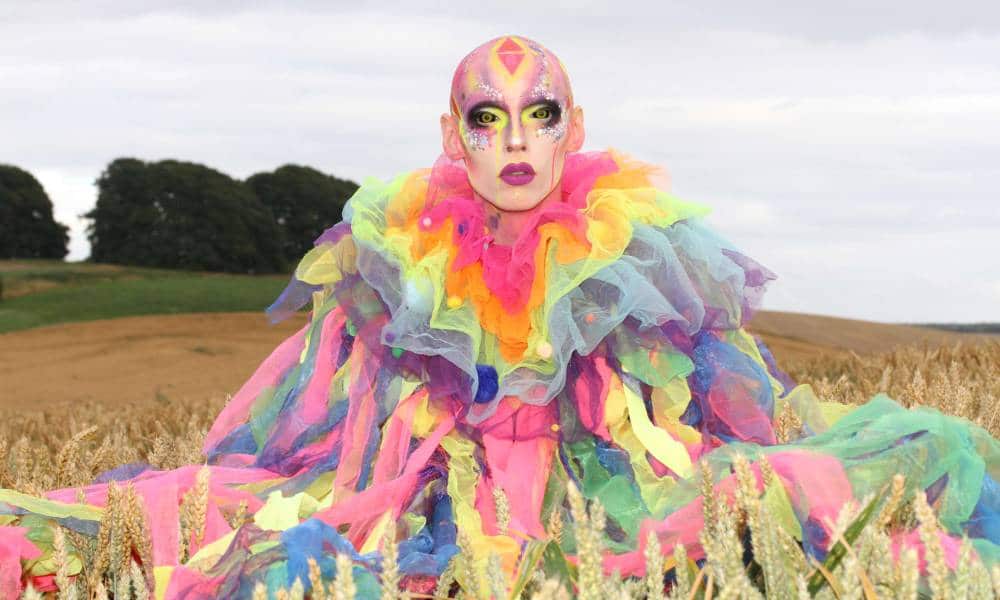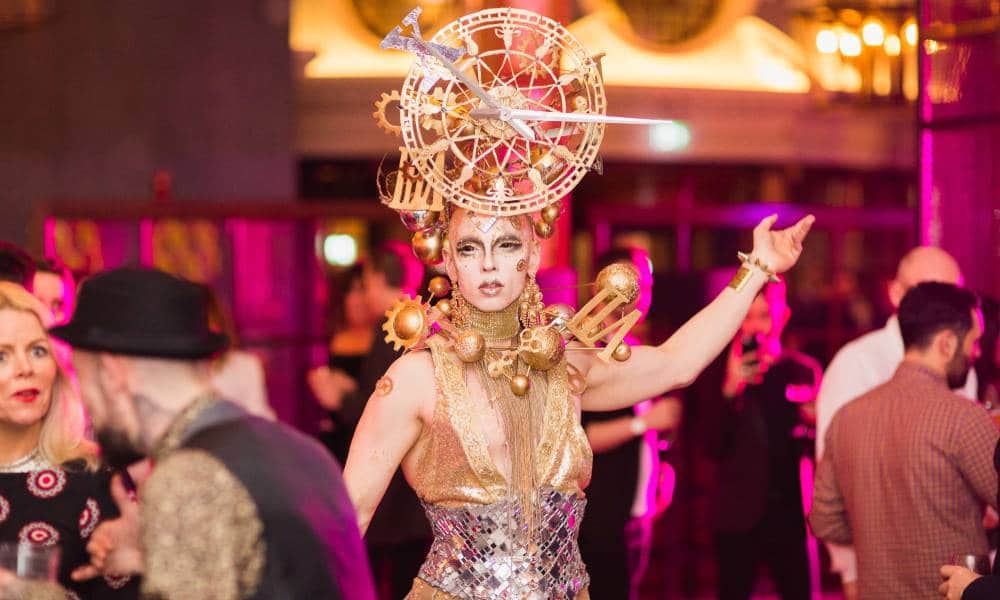‘Disruptively gendered’ drag icon Cheddar Gorgeous to lead Queen’s Platinum Jubilee parade

Manchester drag icon Cheddar Gorgeous will lead a parade on 5 June 2022 celebrating Queen Elizabeth II’s Platinum Jubilee. (Provided)
Drag artist and cultural icon Cheddar Gorgeous has addressed the significance of being a “disruptively gendered person” at the head of a parade for the Queen’s Platinum Jubilee.
Global Grooves – an artist-led carnival arts organisation based in the north west of England – will host a colourful spectacle on Sunday (5 June) as part of the final day of the Platinum Jubilee celebrations. Queen Elizabeth is the first British monarch to celebrate such an achievement after 70 years of service, and the UK is gearing up to honour the 96-year-old’s legacy.
A glorious carnival queen, played by Cheddar, will be at the head of the promenade riding a giant puppet horse, drawing inspiration from the monarch’s beloved horse Burmese. The parade will wind through Westminster and along the Mall, just past Buckingham Palace.
The gorgeous queen will be dressed in a beautiful gold costume with a headdress inspired by a mariner’s astrolabe and a neckpiece inspired by the Trooping of the Colours uniform.
Giant walkabout puppets, a 100-strong young people’s carnival music group, a troupe of costumed dancers and several giant flag bearers will follow behind Cheddar – ensuring that this will be a procession to end all processions.
Cheddar tells PinkNews that it’s “kind of cool” that a “disruptively gendered person” from a working-class background is heading up a procession celebrating the iconic monarch.
“I will be camp. I will be funny,” they say, “don’t get me wrong, I’ll be elegant and all those things, but I’ll also be having fun with it which is what drag’s about.”

Cheddar Gorgeous says it’s “cool” that a “disruptively gendered person” is at the front of a parade celebrating Queen Elizabeth II’s 70-year reign. (Provided)
She adds that she’s part of a wider community of 200 people from the Greater Manchester region participating in the parade. The spectacle draws inspiration from various communities across the commonwealth, including the Caribbean, African and the Indian subcontinent.
Cheddar Gorgeous says he’d “hate for people to get the conception” that he was “somehow representing anything beyond that queer disruptive thing that I do”. So it was important to him that he was “part of a wider community of representatives” in the Platinum Jubilee celebrations.
“The first question that I asked when I was offered the job was, ‘I’m not going to be alone, am I?’” Cheddar recalls. “That’s because I think that, as a very white-skinned person, I was very conscious that there’s a huge amount of people who I simply cannot represent.”
They continue: “I can represent aspects of their experience, things that we might share.
“But there is a huge amount of people’s experience that I can’t, and it’s part of a much bigger parade.”

Cheddar Gorgeous says it’s important that their role in the Platinum Jubilee celebrations was “part of a wider community of representatives”. (Jody Hartley for Vogue NYE)
The celebrated Manchester queen admits that she’s not “going into this without trepidation and awareness” of the “absolutely complicated” legacy that the British monarchy, as an establishment, holds.
“The queen does not have political power here in the UK,” Cheddar explains. “We can’t blame her for having power and not having power at the same time.”
She continues: “You can absolutely draw attention to the legacy of the institution and draw attention to the need to acknowledge those legacies of colonialism.
“In the UK, the queen and the monarchy more generally has a symbolic power that’s about maintaining stability. It’s written into law, the idea of something that goes beyond those shifting tides of political change.
“And stability is a very strange thing for queer people. We often deny ourselves the joys of stability because stability – and patriarchal and parental figures in general and forces and structures of restriction for queer people – are so often a source of oppression for us.”
Cheddar Gorgeous tells PinkNews that sometimes LGBTQ+ people “deny ourselves” the “simple pleasure” of knowing where they’re standing.
View this post on Instagram
He adds that many queer people “live in chaos” because it’s the “only way that they’ve been able to survive”, but he says this constant state of chaos has meant that it’s harder to “find those islands of solid ground that we can enjoy peace from”.
“I think we need to address that because we need to start being able to claim our lang when we can find it and claim our security when we can find it,” they say. “There have been absolutely terrible setbacks for our community during Queen Elizabeth II’s reign, but there have been some incredible moves forward.”
During her 70-year reign, the Sexual Offences Act was passed in 1967 which decriminalised private homosexual acts between men aged over 21 in England and Wales. Just a few years later, in 1972, members of the Gay Liberation Front marched through the streets of London in what would become the UK’s first official Pride march.
The Civil Partnership Act 2004 granted same-sex couples the ability to legally recognise their relationship, but it wasn’t until 2014 that same-sex marriages would enter into law in England and Wales.
Cheddar Gorgeous adds that there have been several laws around the protection of gay people, members of the trans community and women have “all been pushed through”. But they say it hasn’t been a “straightforward victory” as there’s still a debate on how full equity for the LGBTQ+ community can be reached in the UK.
“There’s no straightforward upward curve to celebrate, there is only a continued struggle to recognise,” Cheddar explains.
“Part of that struggle is about occupying representative space, about pushing any way you can your own visibility into certain arenas and that very visibility – whether it’s done through a protest or a pageant – has the potential to be part of a larger change of consciousness.”

